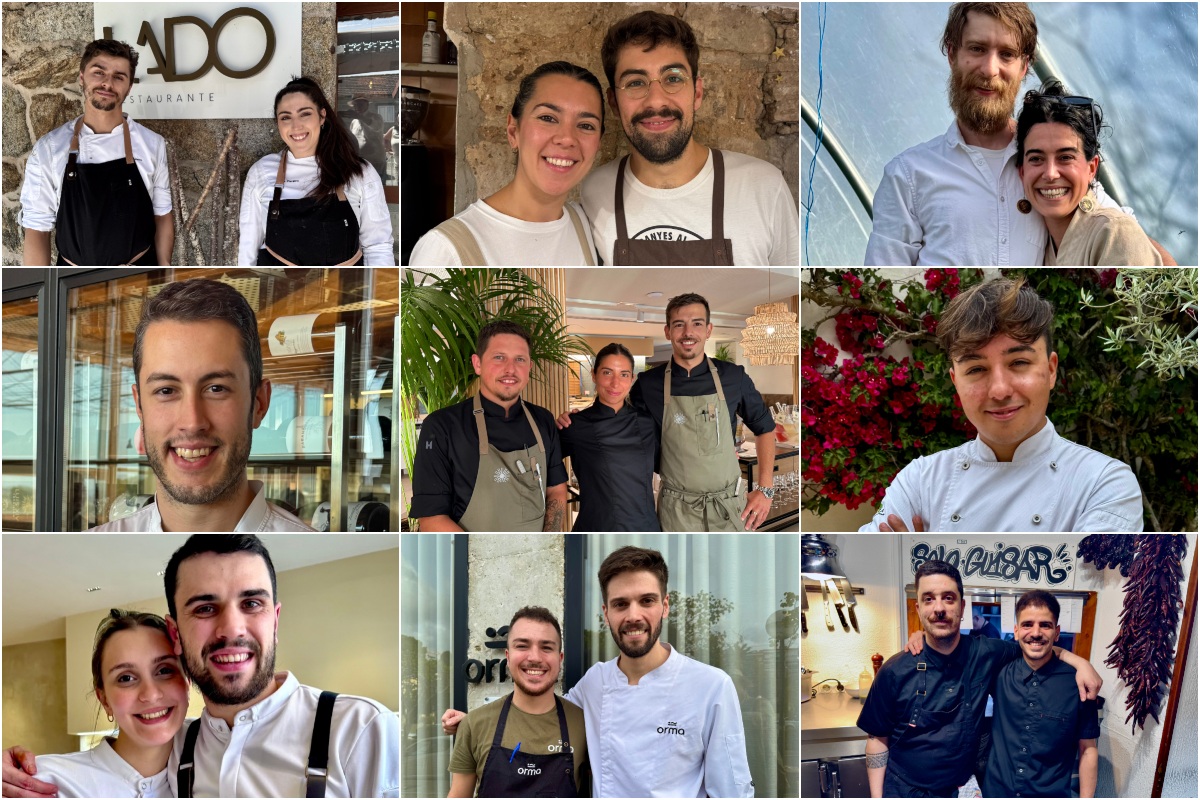News
Science applied to health and healthy gastronomy close the second edition of Dreams

The final day of Madrid Fusión Dreams #spainfoodtechnation explored the impact of science on gastronomy and health, extolling the hospitality industry as the best lever for social welfare.
Rafael Urrialde, professor in the Department of Genetics, Physiology and Microbiology at the Complutense University of Madrid, spoke about how AI can be integrated into the food sector, warning that “from the 21st century onwards there is a new consumer model with new models of well-being. That is why the future of food tech involves using generative AI, with the parameters of the “8 rules”: healthy, sustainable, safe, sufficient, satisfying, supportive and with food sovereignty.
Innovation in food biotechnology is also key for the future, as Daniel Ramón Vidal, Professor of Food Technology at the Cardenal Herrera CEU University in Valencia, assures that “a deep knowledge and the intelligent application of molecular science will be the solution to eradicate hunger and health problems such as obesity, unhealthy aging or infertility,” he said, assuring that China will also lead this industry in the very short time. Something that for Elena Sáenz, director of ANOVE, involves “listening to science in order to innovate based on scientific criteria, and regulate, in a less strict way, the product and not the technology that produces it,” she demanded. She was in agreement with Federico Grau, CEO of MadeinPlant, who believes that “importing the product that others are allowed to produce in their countries generates dependence and a lack of competitiveness.”
Enric Tardio, from the consultancy Innova Market Insights, gave the market view, pointing to health as the generator of the main trends in the creation of new foods this year, “oriented towards improving product quality, ultra-personalization of the target and the fortification of specific properties such as magnesium for mental health care”
Food, good medicine
From the Sant Joan de Déu Hospital in Barcelona, nutritionist Serafín Murillo brought the concept of glucorexia, or the obsession with controlling glucose spikes, to Dreams, a growing trend in the face of the expansion of diabetes “which practically everyone can suffer from at some point in their life. The best way to control ourselves is to eat real food, and tricks such as changing the order in which we eat, cooking food for shorter periods of time or adding healthy fats and fiber to the diet. Along with doing sport, this is chef Paco Roncero's best tip for keeping in shape: “eat consistently to achieve a healthy lifestyle”. He pointed out that “in restaurants it would be impossible to take diabetes into account when creating the menu, as we do with intolerances”.
Then came the turn of fermentation, one of the oldest culinary techniques in the world, with great gastronomic potential but also key in the development of healthier and more sustainable foods. This was how Paula Fernández Gómez, a researcher at the University of León, explained it, warning that “advances will come above all from directed fermentation, which involves a lower risk in food safety but must improve to achieve the organoleptic properties of spontaneous fermentation”. Jordi Cuñé, R&D Manager at ABbiotek Health, added that “fermentation not only transforms the product into a more pleasurable experience; it also increases its nutritional value, which is very interesting in the case of allergies and intolerances”. From the kitchen, Javier Olleros, chef at the Culler de Pau** restaurant in O Grove (Pontevedra), said that he started using ferments “as a way of understanding my environment and preserving it, as well as giving greater complexity to the dishes”, while the researcher Esther Merino explained the products she has made in temples such as Noma, Alchemist and Fango based on animal and vegetable waste, materialized into dishes such as cherry lees ice cream with olive oil caviar or a Fur Martini made with rabbit ears. “90% of animal waste is feathers, hair, ears... they are edible proteins with a high collagen and keratin content,” she said.
Healthy gastronomy, especially in bars and restaurants
The common purpose is the key to a healthier hospitality industry in terms of the well-being of its workers, according to DStage** chef Diego Guerrero, for whom “it is essential to transmit the common motive, which must be in tune with mine, and that is none other than to move the business forward, because without business there is no team”. Meritxell Obiols, an expert in gastro coaching, emotional intelligence and leadership, says that “as in any company, attitudes born of stress, such as the chef shouting, are normalized in a restaurant, but this is changing thanks to strategies aimed at the well-being of the team. A good leader in the kitchen looks at the dish in a panoramic way, because it is not done alone”. For his part, David Seijas, former sommelier at El Bulli and founder of Gallina de Piel Wines, evoked the personal experience he has captured in a book, assuring that ‘working in a kitchen of that level means playing in the Champions League every day, and it is dangerous if you don't know how to manage the pressure or the ego’.
And moving on to another group, the elderly have become an opportunity for economic and social development; it is the Silver Economy, which drives new demands in terms of gastronomy, and which promotes initiatives such as the one in the Community of Madrid that invites us to “Add life to the years and not years to life, spreading the benefits of a healthy diet and physical activity. The objective is to live more years with the capacity for autonomy”, explained Susana Belmonte, General Directorate of Public Health of the Madrid government. For his part, catering consultant Juan Mediavilla stressed that ‘the pleasure obtained from eating is the key element, in addition to the company and sharing that it entails, which is why, in addition to the nutritional properties of a dish, in residences we must work on its preparation and presentation’. Among the audience was Pedro Subijana, for whom it is essential to “create the subject of food from school, so we will learn to eat well all our lives”.
The benefits of eating with others were discussed at another table, highlighting the therapeutic value of “going down to the bar”. Because according to Sergio Gil, president of the Sustainable Restaurants Foundation, the bar is a space that provokes a very particular type of socialization, since it brings love, complicity and, above all, continuous learning, something that, if conceptualized, leads to health. In villages, moreover, it is a necessary agora that, when it disappears, even political positions become radicalized. When a bar dies, a village dies,” he lamented. In fact, nurse Anna Ramírez brought to Dreams the SALSA project (acronym for health, food and sociability) of the Alícia Foundation and designed with the Research and Innovation Unit of ICS Catalunya Central - IDIAPJGol, with the support of the Social and Health Innovation Hub (HiSS), which “instead of diets or psychotropic drugs, proposes to prescribe healthy meals in the restaurant to improve and prevent nutritional and emotional problems”. Finally, the General Secretary of Hostelería de España, Emilio Gallego, concluded that “what we eat is as important as the way we eat it, and drinking alone offers a greater risk of addiction, since doing it in a group implies a social control that leads to moderate consumption”, and pointed out that “drinking alone offers a greater risk of addiction, since doing it in a group implies a social control that leads to moderate consumption”, and revealed that “the latest studies we have carried out in Madrid showed that a municipality without a bar loses up to 50% of its tourism capacity, no matter how many monuments it has”.
The Secretary General for Agricultural Resources and Food Safety at the Ministry of Agriculture, Fisheries and Food, Ana Rodríguez Castaño, took advantage of the Dreams framework to present the National Food Strategy, “a comprehensive plan that seeks to face challenges and take advantage of opportunities in a global context marked by technological transformation and climate change, in which gastronomy is highly relevant, accounting for nearly 30% of the Spanish economy, generating more than 7 million jobs”.










